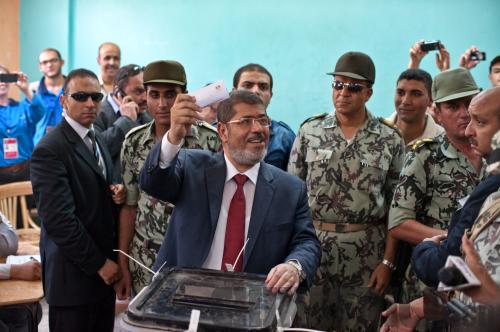|
 |
|
Turning Point: Mohamed Morsi votes at the presidential runoff election on June 16 (LI MUZI) |
The political situation in Egypt continues to attract attention from the international community. Though the military-controlled authority has taken a series of measures to push the country forward, such as the trials of former President Hosni Mubarak, who ruled the country for 30 years, and committing to hand over the power after presidential election, various political forces are wrestling hard for their political interests around the presidential election.
A power in the Middle East, Egypt took a different road from "Libya mode" and "Yemen mode" after Mubarak stepped down in February 2011. The military took over power to avoid foreign interference. Thus, its political development relies mainly on the struggles of various political factions within the country.
On May 23-24, the first presidential election after Mubarak resigned was held. Mohamed Morsi, supported by Muslim Brotherhood, and former Prime Minister Ahmed Shafik were elected for the final election with 24.3 percent and 23.3 percent of the votes respectively. The second-round competition between them was held on June 16-17. According to the electoral commission of the country, Morsi won 51.7 percent of the votes and will lead the country in the post-Mubarak era.
The smooth and successful operation of the presidential election reflects that Egypt is striving to embark on a democratic road, and its democratization process is irreversible.
Electing a new president is only the first step to restore the country's stability. The top of the new government's agenda should be maintaining national reconciliation. Only after the new government reconciles various political factions can the country maintain stability and have the opportunity to rejuvenate its economy. For this purpose, the new ruling party should take the people's interests into consideration instead of focusing only on its party's interest, so as to gain confidence from the people.
Another important and necessary task for the new government is to recover the country's economic development and focus on creating more job opportunities and increasing people's income. Tourism is Egypt's pillar industry, but was seriously impacted during the political chaos. The new government should take measures to restore its tourism industry.
In addition, efforts should be made to energetically promote social equality and justice so as to reduce and crack down on corruption.
For this political and social transformation, Egypt has paid a heavy cost. From January 24, 2011 when many people took to the street to protest Mubarak's long-term ruling until today, the political situation in Egypt is still in chaos.
First of all, the chaos has led to severe domestic political division. The lasting street revolution has further divided political forces in the country. To gain their own interests, various political factions struggled against each other. Common people have expressed their dissatisfaction against street politics since they long for a stable life. Egypt has 50 million legal voters. In the first-round presidential election in May, only 23.67 million voters came out to vote; media reported that only 40 percent of the voters voted in the second round of election on June 16-17. This indicates that people were not so enthusiastic about the ballot.
More importantly, the political unrest severely damaged Egypt's economy. Over the more than one and a half year period, the country's tourism industry and foreign direct investment suffered great losses, with the unemployment rate increasing rapidly, foreign exchange reserves dropping sharply, inflation becoming severe and the financial deficit going up greatly. In 2011, Egypt's economic growth was only 1.8 percent, 3.3 percentage points lower than that of 2010, which was 5.1 percent. According to predictions of the International Monetary Fund, Egypt's economic growth this year will be 1.5 percent and 3.3 percent the next year.
Finally, the country's security situation has become vulnerable. Though the presidential election was held, the struggles among various political factions have cast shadows in the hearts of the people. Under the circumstances, any small friction may trigger great conflicts. On February 1 this year, the Port Said football violence killed 73 people and injured several hundred others. This tragedy also revealed the severe security situation in Egypt.
Despite all these challenges, Egyptians have the political wisdom to solve all their difficulties. The presidential election shows that the Middle East power with its glorious ancient civilization is marching forward on the road to democratization. Egyptians are sure to find the political system and development path suitable for its national conditions.
(The author is deputy director of the African Studies Center of Shanghai Normal University)
|